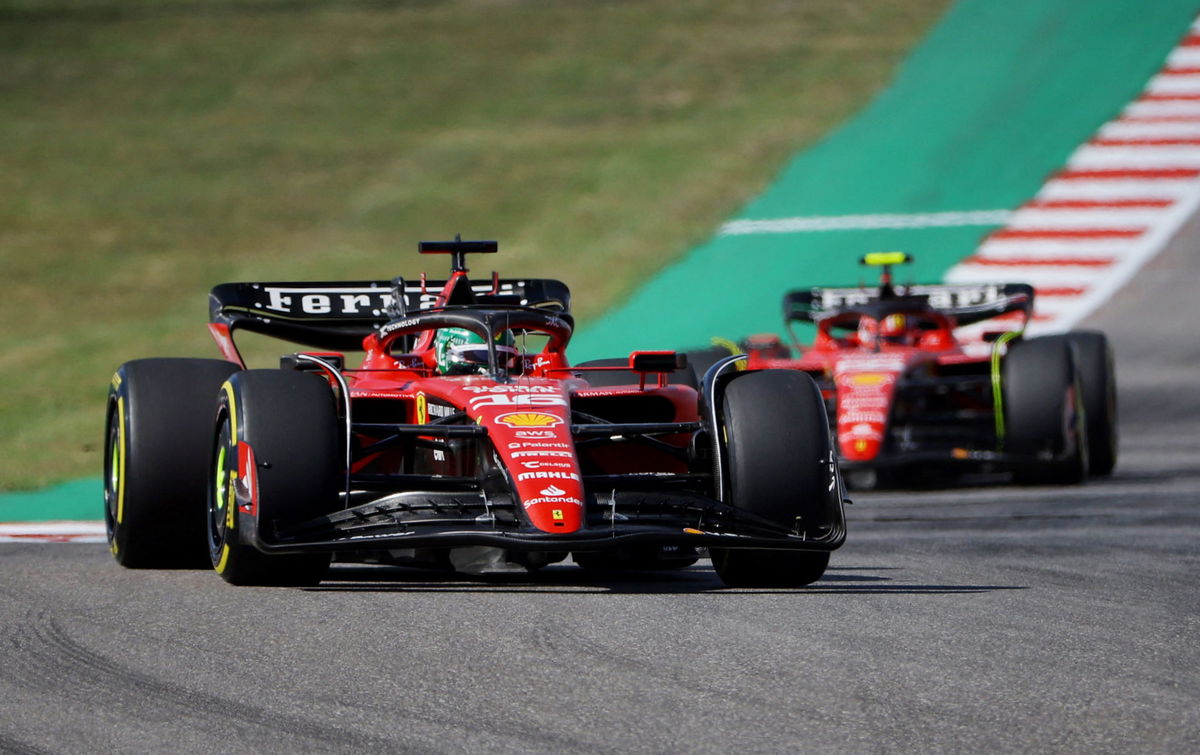
Reuters
Formula One F1 – United States Grand Prix – Circuit of the Americas, Austin, Texas, U.S. – October 22, 2023 Ferrari’s Charles Leclerc in action during the race REUTERS/Brian Snyder

Reuters
Formula One F1 – United States Grand Prix – Circuit of the Americas, Austin, Texas, U.S. – October 22, 2023 Ferrari’s Charles Leclerc in action during the race REUTERS/Brian Snyder
Formula 1 is getting ready for another major regulation change in 2026. It all goes back to the FIA’s decision in 2014 to introduce hybrid systems, setting the stage for years of technological innovations. Fast forward to today, and we find ourselves on the cusp of the 2nd regulatory change, with a major focus on the F1 Power Units. And now reports are stating that Ferrari has become the first team to test the prototype 6-cylinder turbo engine set to arrive in 2026. However, Mercedes has a head-start in terms of the development timeline and Christian Horner reveals his biggest challenge as he gears up for his 20th season with Red Bull.
Watch What’s Trending Now!
A big part of the new regulations is the debut of a carbon-free fuel, a key stride towards the 2030 “Net Zero Carbon” initiative undertaken by Formula 1. This new fuel promises to eliminate fossil fuel emissions from the F1 racing. But that’s not the only change coming in 2026. The MGU-K unit, responsible for harnessing kinetic energy, will also undergo a major upgrade, turning into a powerhouse with three times the output. Going up from 120 kW, it will boast a staggering 350 kW.
While the battery’s capacity technically remains unchanged, the increased electric motor output will demand entirely new energy management strategies from the teams and the drivers. However, not all Power Unit components will survive the new regulations. The MGU-H, tasked with recovering lost energy, will no longer feature in 2026 engines. This bold move is a bid to simplify and reduce costs, making way for new manufacturers into the F1 engine landscape.
ADVERTISEMENT
#F1 chiefs have confirmed that the MGU-H will be dropped from powerunits from 2026 as part of a new rules shake-up in a bid to attract new manufacturers.
Full story ⬇️https://t.co/kZfiegwHya
— Autosport (@autosport) December 15, 2021
All these changes are centered around making the cars more fuel efficient. The fuel amount allowed for a race will diminish, dropping from about 100 kg to approximately 70 kg in 2026. Yet, the FIA has assured that the power output will remain relatively unchanged. As the 2026 F1 season draws near, whispers of excitement fill the air. Predictions include the arrival of new teams, injecting unpredictability into the established hierarchy.
ADVERTISEMENT
Ferrari has tested the first 6-cylinder turbo engine slated for 2026
Amidst the anticipation leading up to the 2026 season, news has emerged that Ferrari has achieved a big milestone. According to Motorsport Italia, the first prototype of their 6-cylinder turbo engine destined for the 2026 Formula 1 season has been successfully tested on the dyno.
While this won’t be the power unit that will make its way in the 2026 championship car, it signifies the completion of the initial experimental phase, showing Ferrari’s commitment to staying ahead in the race to develop these new engines. Now the team can focus on the next phase, which will be to develop the engine for the smaller and lighter cars that will debut in 2026.
ADVERTISEMENT
What sets Ferrari apart though is its attention to the combustion process. In 2026, Formula 1 is set to introduce zero-impact fuels, incorporating e-fuel or biofuel. Ferrari’s collaboration with AvL, the renowned research center in Graz with important knowledge of hybrid engines, positions them at the front of the race.
Top Stories
Who Is Oscar Piastri’s Father, Chris Piastri? Co-Founder of Multibillion Dollar Automotive Company

Know the Emotional Story Behind Special Star on Carlos Sainz’s Helmet

Who Are Lando Norris’s Parents? Meet Adam Norris and Cisca Wauman

Charles Leclerc’s Bikini Clad GF Alexandra Disgusts Fans’ as Her Hypocrisy Becomes Hard to Digest

“Is That Alexandra?”: Charles Leclerc’s Ex-GF Finds Herself in Middle of Drama as Fans Make Shocking Observation

The future is coming! 🍃
A 100% sustainable drop-in fuel to go hand-in-hand with our new 2026 engines ✨
Let’s take a closer look at the revolutionary change coming F1’s way…👇 pic.twitter.com/sHIEIBotk0
— Formula 1 (@F1) April 24, 2023
ADVERTISEMENT
While Ferrari may have tested the prototype engine, reports are also suggesting that Mercedes may actually be ahead of them.
Mercedes has a head-start on the 2026 engine as Red Bull faces its biggest challenge yet
As teams gear up for the challenge to put together the 2026 spec Power Unit, there are reports shedding light on the development timeline, revealing that F1 teams are already deep into their respective projects, aiming to have their power units tested by 2024.
ADVERTISEMENT
A recent report has suggested that Mercedes is taking the lead in the race towards developing engines for the 2026 season. According to Formu1a.uno, the Brackley-based team is ahead of its competitors by “a few months” in the pursuit of meeting F1’s stringent engine regulations. This early advantage could potentially give Mercedes a crucial edge on the track when the 2026 season kicks off.
Mercedes is reportedly ahead of its competitors in terms of engines for 2026.
2026 Aerodynamic car concepts will be based on engine efficiency.
The first complete engines will be on the test bench in 2024. Mercedes will be the first team to test theirs.
[@formu1a__uno] pic.twitter.com/9eC6ZkUxn1
— Mercedes-AMG F1 News (@MercedesNewsUK) November 7, 2023
While things are looking positive for Mercedes and Ferrari, Red Bull, on the other hand, is facing the biggest challenge in their F1 history yet as pointed out by the team principal Christian Horner. In a recent interview with Motorsport Italia, Horner spoke about his career at Red Bull, who will be heading into his 20th season as team principal of the Milton Keynes squad. He spoke about the challenges that are ahead for the team even though they are dominating the sport right now.
ADVERTISEMENT
“The biggest challenge of my career is underway, and it involves the Red Bull Powertrains project,” said Horner. When asked if designing their own power unit was really the biggest challenge he has faced in 20 years, Horner responded, “Absolutely, 100% because it means starting from scratch and going to confront Ferrari, Mercedes, and Honda, and we face this challenge as the rib of a group that produces and sells an energy drink. We have a very good relationship with Ford, but the engine will be designed and manufactured in Milton Keynes.“
AMuS can reveal first renderings of the next-gen F1 car planned for 2026.
– wheel base -20cm
– width -10cm
– 16 inch wheels
– inwash aero concept (FW & floor)
– new RW design
– wider flow deflectors
– active aero (FW & RW)More pics & infos on AMuS:https://t.co/Z94TJyiDPF pic.twitter.com/e07QNLvgGh
— Tobi Grüner 🏁 (@tgruener) November 15, 2023
Watch This Story | Will Lewis Hamilton Consider a Move to Ferrari if Mercedes Doesn’t Deliver?
ADVERTISEMENT
It’s still 2 seasons away, but who do you think will come up with the best Power Unit package when the new regulations hit in 2026? Share your thoughts in the comments below.
ADVERTISEMENT
ADVERTISEMENT
ADVERTISEMENT

